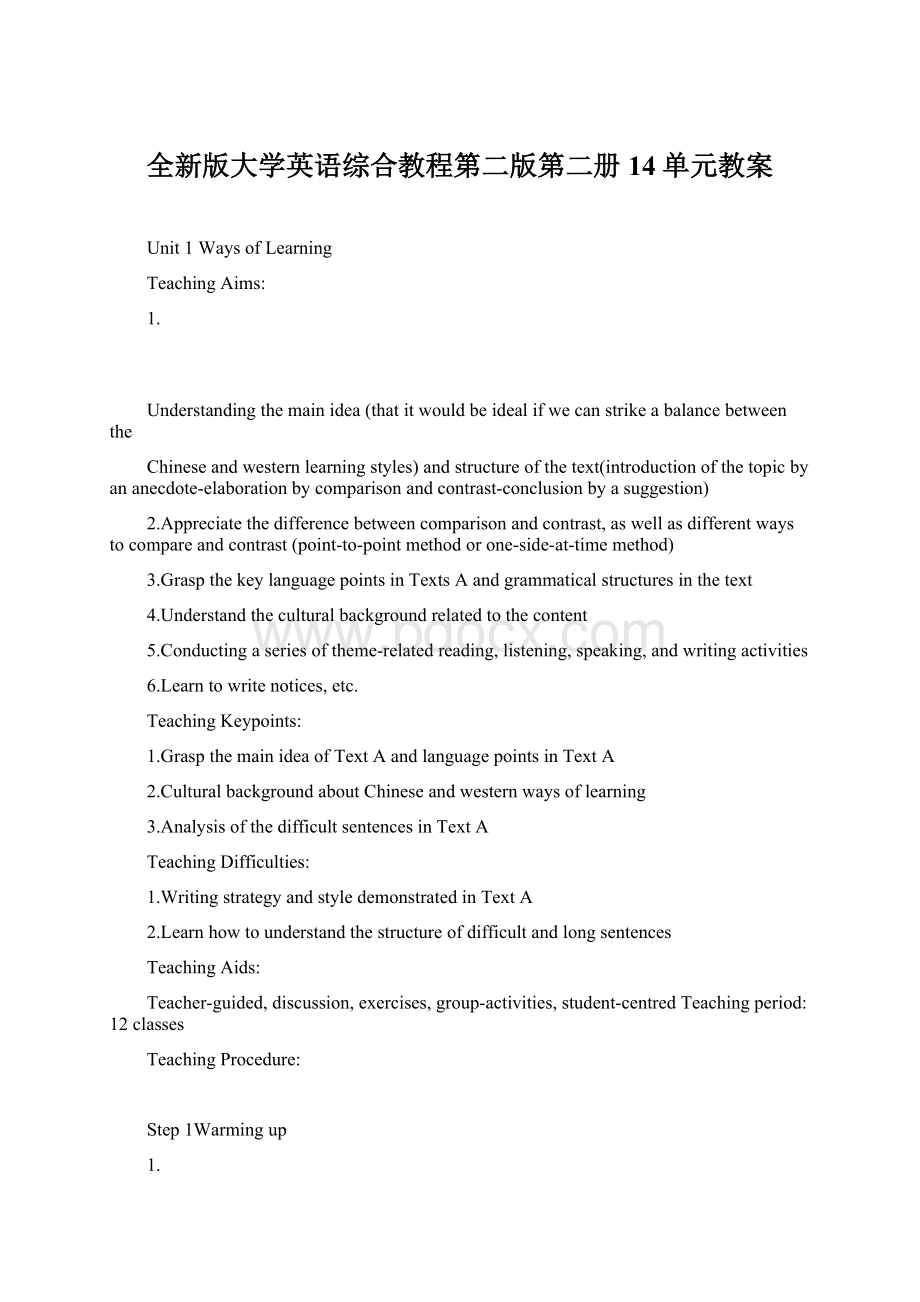全新版大学英语综合教程第二版第二册14单元教案.docx
《全新版大学英语综合教程第二版第二册14单元教案.docx》由会员分享,可在线阅读,更多相关《全新版大学英语综合教程第二版第二册14单元教案.docx(51页珍藏版)》请在冰豆网上搜索。

全新版大学英语综合教程第二版第二册14单元教案
Unit1WaysofLearning
TeachingAims:
1.
Understandingthemainidea(thatitwouldbeidealifwecanstrikeabalancebetweenthe
Chineseandwesternlearningstyles)andstructureofthetext(introductionofthetopicbyananecdote-elaborationbycomparisonandcontrast-conclusionbyasuggestion)
2.Appreciatethedifferencebetweencomparisonandcontrast,aswellasdifferentwaystocompareandcontrast(point-to-pointmethodorone-side-at-timemethod)
3.GraspthekeylanguagepointsinTextsAandgrammaticalstructuresinthetext
4.Understandtheculturalbackgroundrelatedtothecontent
5.Conductingaseriesoftheme-relatedreading,listening,speaking,andwritingactivities
6.Learntowritenotices,etc.
TeachingKeypoints:
1.GraspthemainideaofTextAandlanguagepointsinTextA
2.CulturalbackgroundaboutChineseandwesternwaysoflearning
3.AnalysisofthedifficultsentencesinTextA
TeachingDifficulties:
1.WritingstrategyandstyledemonstratedinTextA
2.Learnhowtounderstandthestructureofdifficultandlongsentences
TeachingAids:
Teacher-guided,discussion,exercises,group-activities,student-centredTeachingperiod:
12classes
TeachingProcedure:
Step1Warmingup
1.
2.
Havestudentsreadtheoverviewofpage2,studentswillunderstandthemaintopicofunit
(waysoflearninginChineseandwesterncountries)
Havestudentslistentothescriptoflisteningpart,explainsomedifficultsentencesand
phrases,leadthemtofinishtheexercisesonpage3,checktheanswer
3.Howtounderstandthefollowingsentences:
Standingontheshouldersofgiants
4.Explaintheculturalnotesofeducationinthewest
5.Inclass,studentsformtwocampstodebatethefollowingissue:
Ifyouhaveababy,whichwaywouldyouprefertouse,topaymoreattentiontodevelopmoreskillsortocreativity?
Step2GlobalanalysisofTextA
Ⅰ.Scanning
1
Benjaminwasworriedthathecouldn
’tputthekeyintothebox.(F)
(=Benjaminwasnotbotheredatall.)
2.
IntheChinesestaff
’sopinion,theparentsshouldguideBenjamintoinsertthekey.(T)
3.
Theauthorandhiswifedidn
’tcarewhetherBenjaminsucceededininsertingthekeyintothe
slot.(T)
4.FortheWesterners,learningshouldtakeplacebycontinualcarefulshapingandmolding.(F)(=TheChinesethinkthatlearningshouldtakeplacebycontinualcarefulshapingandmolding.)
6.Chineseteachersholdtheopinionthatskillsshouldbeacquiredasearlyaspossible,whileAmericaneducatorsthinkthatcreativityshouldbeacquiredearly.(T)
7.Addmorequestionsaboutthetext:
Whereandwhendidtheincidenttakeplace?
Whoarethemaincharactersinthisincicent?
WhatisHowardGardner?
WhydothecouplecometoChina?
Howoldisthesonoftheauthor?
Throughwhatdoesthebabygetpleasureintheincident?
Whatistheattitudeofhisparents?
WhatistheattitudeofthehotelstafftowardsBenjamineffort?
8.Answerthequestionsofonpage10-11
ⅱUnderstandingthemainideaofthetextDivisionoftheTextA
PartsPara(s).MainIdeas
1
1~5
Thetextbeginswithananecdote.
2
6~13
Theauthor’sthoughtsaremainlyaboutdifferentapproachestolearning
inChinaandtheWest.
3
14
Theauthorwindsupthetextwithasuggestionintheformofaquestion.
Step3DetailedReadingofTextA
Ⅰ.DifficultSentences
1.(LL.13~15)Becauseofhistenderageandincompleteunderstandingoftheneedtopositionthekeyjustso,hewouldusuallyfail.
Paraphrasethesentence.(=Becausehewassoyounganddidn’quiteknowthatheshouldpositionthekeycarefullytofitintothenarrowkeyslot,hewouldusuallyfail.)
2.(L.15)Benjaminwasnotbotheredintheleast.(=Benjaminwasnotbotheredatall.)
3.(L.30)⋯andtothrowlightonChineseattitudestowardcreativity.
AndtohelpexplainChineseattitudestowardcreativity.
4.(LL.37~39)⋯sincethechildisneitheroldenoughnorcleverenoughtorealizethedesiredactiononhisown,whatpossiblegainisachievedbyhavinghimstruggle?
Whatdoesthedesiredactionreferto?
(=Positioningthekeycarefullytofitintotheslot.)
5.(L.39)Hemaywellgetfrustratedandangry.(=Heislikelytogetfrustratedandangry.)Eg.Youuse“maywell”whenareyousayingwhatyouthinkislikelytohappen.
6.(L.47~48)Hewashavingagoodtimeandwasexploring,twoactivitiesthatdidmattertous.Whatdothetwoactivitiesreferto?
(=Havingagoodtimeandexploring.)
“activitiesthatdidmattertousactivitiesthat”.were(=importanttous.)
7.(L.52)⋯whetheritbeplacingakeyinakeyslot,drawingahenormakingupforamisdeed⋯=Nomatterwhetheritisplacingakeyinakeyslot,drawingahenormakingupforsomemistakes.)thesubjunctivemood
eg.Whetherhebepresentorabsent,weshallhavetodoourpart.)
8.(LL.80~81)⋯youngWesternersmakingtheirboldestdeparturesfirstandthengradually
masteringthetradition(西方的⋯年轻人先是大胆创新,然后逐渐深谙传统。
)
Whatdoesmakingtheirboldestdeparturesmean?
(=Doingsth.differentfromanestablishedruleortradition.)
9.(LL.98~99)ButassumingthatthecontrastIhavedevelopedisvalid,andthatthefosteringof
skillsandcreativityarebothworthwhilegoals⋯
assuming+that-clause:
假定⋯Youuseassumingthatwhenyouareconsideringapossiblesituationorevent,sothatyoucanthinkabouttheconsequences.
Eg.Assumingthatweallworkatthesamerate,weshouldbefinishedbyJanuary.)
10.(LL.100~102)Canwegather,fromtheChineseandAmericanextremes,asuperiorwaytoapproacheducation,perhapsstrikingabetterbalancebetweenthepolesofcreativityandbasicskills?
我们能否从中美两个极端中寻求一种更好的教育方式,它或许能在创造力与基本技
能这两极之间获得某种较好的平衡?
)
Step4WordsandExpressionsofTextA
1.(L.7)attach:
vt.fastenorjoin(onethingtoanother)
*Sheattachedanantennatotheradio.(=Atagwasattachedtoeacharticle.)
Pattern:
attachsth.tosth.beattachedtosth.
2.(L.21)initial:
adj.oforatthebeginning;first
最初的会谈是后来达成协议的基础。
(=Theinitialtalkswerethebaseofthelateragreement.)
*theinitialletterofaword
一个词的首字母
3.(L.25)await:
vt.waitfor
Hewasanxiouslyawaitingherreply.
他早就期待着这个时刻了。
(=Hehaslongawaitedthismoment.)
4.(L.25)onoccasion:
nowandthen
Ithas,onoccasion,createdtroubleforthebank.
你有时使人们感到诧异。
(=Youhaveonoccasionsurprisedpeople.)
CF:
onoccasion&ontheoccasionof
onoccasion有时,间或。
ontheoccasionof在⋯之际。
ontheoccasionofsb.'swedding
5.(L.26)neglect:
vt.givetoolittleattentionorcareto
*neglectone'smealsandsleep离开时别忘了锁门。
(=Don'tneglecttolockthedoorwhenyouleave.)
CF:
neglect,ignore&omit这几个词都有忽略、遗漏之意。
neglect指对职责、义务或应做的事没有给予足够的注意。
这种忘记可能是有意的,也可能
是无意的。
例如:
Thosewhoneglecttheirdutiesshouldbepunished.玩忽职守者应受惩罚。
Whydotheyalwaysneglectthetrafficregulation.他们为什老是不注意遵守交通规则呢?
ignore指疏忽、不顾,强调对某人或某物故意不理会,有时还带有固执地拒绝的意味。
例如:
WhenIsawTom,Istoppedtogreethim,butheignoredmeandwalkedon.当我看到汤姆时,我停下来和他打招呼,但他没有理我继续往前走。
Theteacherignoredmydifficultquestions.老师对我的难题置之不理。
omit指因专注或疏忽而忘记某事,这种失误可能是有意或无意的。
该词还可指删除不利或
不必要的东西。
例如:
Sheshouldnotomittovisitthemuseum.她不应忘了去参观博物馆。
Thethirdpartofthebookmaybeomitted.该书的第三部分可以删掉。
6.(L.28)relevant:
adj.directlyconnectedwiththesubject(=Hiscolorisnotrelevanttowhetherhe'sagoodlawyer.)(=Theevidenceisrelevanttothecase.)该证据与此案有关。
7.(L.29)investigate:
vt.trytofindoutinformationabout
*Scientistsareinvestigatinghowtheplanecrashoccurred.
*Ifyouhearsucharumor,investigateitthoroughly.
vi.makeadetailedinquiry*investigateintoanaffair*investigateintoarumor
CF:
investigate,examine&inspect
这几个词都有调查、检查之意。
investigate较正式,指有条不紊地进行调查研究以发现事实真相,更常用以说明调查案件、情况、背景来历等。
例如:
*Theyinvestigatedthecauseoftheaccident.他们调查了事故的原因。
*Thepoliceareinvestigatingthemurder.警方正在调查这件谋杀案。
examine是普通用语,指仔细地检查某人或物。
该词还指官方主持的检查或医生进行的诊察,也表示对某种观点的讨论研究,更指考试。
例如:
*Theyexaminedourpassportsverycarefully.他们仔细检查了我们的护照。
*Anopticianisqualifiedtoexamineyoureyesandprescribeglasses.
眼科医生有资格来检查你
的眼睛并给你配眼镜。
inspect
较正式,用得不如
examine
广泛,指对某人或某物进行检查、查问,带有揭示其差
异或缺陷的意思。
更常指官员们的视察以发现下属单位的缺点等,还指检阅军队。
例如:
*Thefiremenwereinspectingthewarehouseforpotentialfirehazards.消防人员正在检查仓库
以防火灾。
*Everylengthofclothisinspectedbeforeitleavesthefactory.出厂之前每寸布匹都检查过。
8.(L.30)throwlighton:
helpunderstanding*Thesefactsthrownewlightonthematter.
这些事实使人进一步了解此事。
9.(L.34)exception:
n.sb./sth.thatacommentorstatementdoesnotapplyto(=Thereisanexceptiontothisgrammaticalrule.)
(=Thisisanapparentexceptiontotherule.)这是那项规定的一个明显的例外。
Pattern:
anexceptionto
Collocation:
withmany/fewexceptions有很多/很少例外
withoutexception毫无例外,一律withtheexceptionof
makeanexceptionof把...作为例外makenoexceptions
除⋯之外
不容许有例外;一视同仁
10.(L.39)desirable:
adj.worthhavingasbybeinguseful,advantageous,orpleasing;worthachieving
*MainStreetisaverydesirablelocationforalargedepartmentstore.*Itismostdesirablethatheshouldattendtheconference.
NB:
antonym:
undesirable
11.(L.41)accomplish:
vt.managetodo(sth.)
*She'saccomplishedagreatdealinthelastfewweeks.
这项任务不是在一代人的时间里所能完成的。
(=Thetaskwillnotbeaccomplishedinonegeneration.)
accomplishone'sobject/goal达到目的accomplishone'smission完成使命
CF:
accomplish,complete&finish这三个词都含“完成”的意思。
accomplish通常接task,aim,journey,voyage等名词,有时兼有取得效果之意。
例如:
*Idon'tfeelourvisitreallyaccomplishedanything.我不认为我们的访问真正取了什么结果。
complete比accomplish具体,可接建筑、工程、书籍等名词,指按预期目的把未完成的工作经过进一步的努力使之完成,主要涵义是补足缺少的部分。
例如:
*Thebuildingwillbecompletedbytheendofthismo